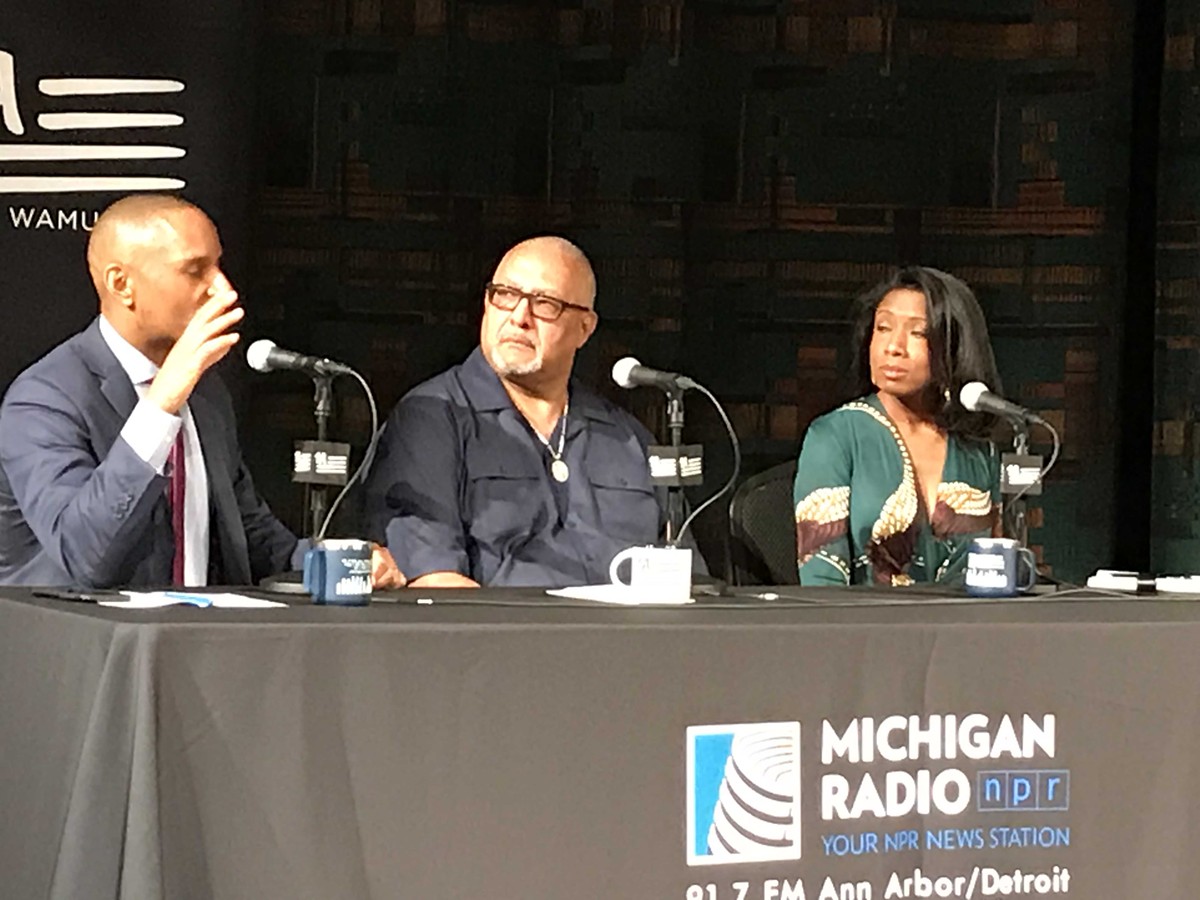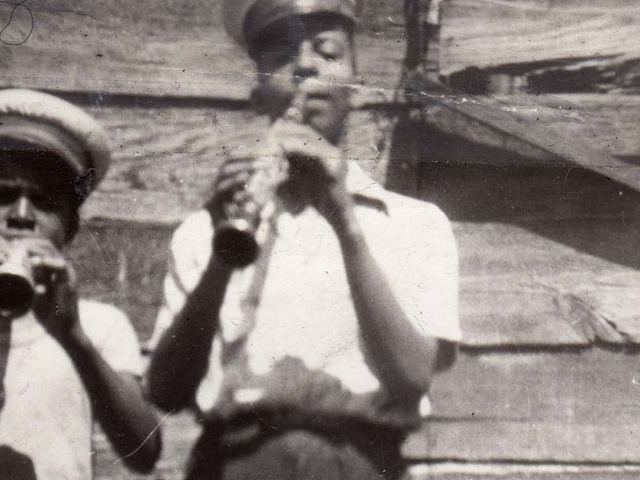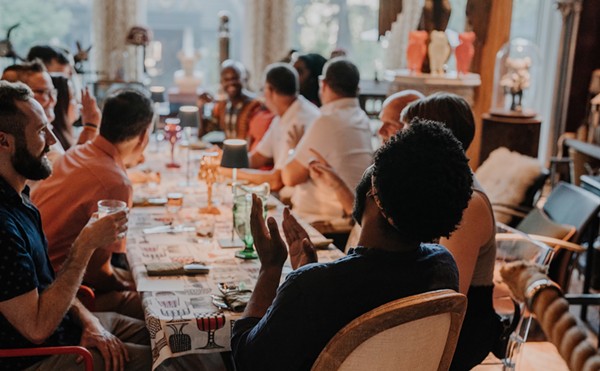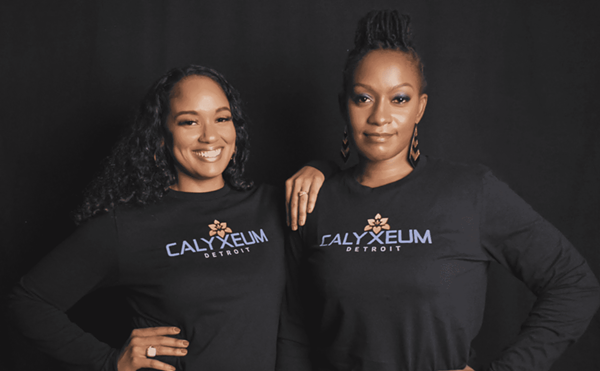In the end, all the panelists at "Weed's Legal ... Now What?" — a free forum held at the Charles H. Wright Museum of African American History — agreed that expungement of records for marijuana crimes is the big change they would like to see in our marijuana laws.
Other than that, Rev. Horace Sheffield III, who sat on a panel with attorney Barton Morris and BotaniQ provisioning center co-owner Anqunette Jamison Sarfoh, didn't see much good in legalizing marijuana for adult use.
Morris, who's defended folks accused of marijuana offenses for the past 20 years, and Sarfoh, a former news anchor, support developing the marijuana industry. The discussion was moderated by Joshua Johnson for Michigan Radio's 1A Across America morning show, and Michigan Marijuana Regulatory Agency director Andrew Brisbo was there to give guidance on rules and compliance.
It almost seemed like Sheffield — CEO of the Detroit Association of Black Organizations and longtime political and community activist — hasn't really processed that the law has changed. He kept arguing that he doesn't support legalization. That may be the case, but Earth to Sheffield: marijuana legalization has become law, so now it's a question of how you're going to deal with it. He was adamant that marijuana is a "gateway drug" and had a neat story to support his assertion.
In his youth, Sheffield smoked marijuana. He worked in the entertainment industry managing bands and traveling with the likes of the Temptations and others. Some of those others were using cocaine, and while he held out as long as he could, he says his marijuana use made it seem like it was also OK to use cocaine. Shortly thereafter, he had a six-month cocaine addiction before he sought help. As he sees it, marijuana was the gateway to his cocaine use.
Another thing that Sheffield banged on was the erroneous idea that Prop. 1, the marijuana legalization law, had promised expungement for folks who had certain related convictions. He carried on that voters were misled about it, until Sarfoh explained that expungement was never a part of Prop. 1 because an initiative can only address one issue — in this case, legalization.
The bottom line is that now the political and community leadership in Detroit has to be brought on board in order for the marijuana business to thrive. Sheffield is a community leader and he apparently hasn't even bothered to take the time to understand what the law encompasses as he takes an opposition position just because it's marijuana.
He even led with the tired statement that legalizing marijuana "sends the wrong message to people, especially in our community." That's basically code for "That may be OK for those white boys out in the suburbs, but these brothas in the hood are too unstable to handle that shit."
I'm going to ignore all the sick psycho-social implications of that attitude from one of our community leaders and stick to the issue of weed. At least Sheffield admits that there may be some medical uses for marijuana, although he specifically pointed out that when he had cancer he didn't use marijuana because he didn't want to relapse. Apparently Sheffield believes if you use marijuana to help treat cancer, you will soon be sniffing loads of cocaine.
I'm giving it to Sheffield a little hard here because he was the only person onstage opposing marijuana. Johnson announced that the Detroit Chapter of the NAACP had been invited but no one there had even acknowledged the invitation. I could have told him not to bother. I gave up trying to talk to them about marijuana years ago after they had nothing to say when the NAACP national board came out in support of marijuana legalization.
At least Sheffield came out to speak, even though he was severely misinformed. That's the impediment the marijuana industry faces in Detroit, though — an establishment that still acts like it'll go away if they just ignore it.
When it came time for questions from the audience, Margeaux Bruner, political director for the Michigan Cannabis Industry Association, asked Sheffield about church ministers opposing the marijuana industry development, and pointed out that the "church community is largely connected to the political community." That was on target in addressing some of the organized opposition to marijuana businesses in Detroit.
Sheffield tried to slide past this one by claiming that the ministers had no political power in Detroit. That seems to fly in the face of how politics work in Detroit. Attorney Morris put it bluntly in saying the churches definitely have influence, and it has not been used to "ensure minority participation has been protected in the influence exercised by the church community."
Now we're getting to the crux of the matter. Once the city of Detroit got its collective head out of the sand and started paying attention to marijuana businesses, it's been mostly about where you can't have a marijuana business. One of the most crippling zoning rules is that they cannot be within 1,000 feet of a church. In Detroit we have a lot of churches, so that covers a lot of territory, and while there may be a few ministers here and there who are cannabis-friendly, by and large the organized church ministry opposes anything to do with marijuana.The lesson here is that for the marijuana business to flourish in Detroit, it’s going to take pressure on our community leaders.
tweet this
That becomes even more crucial when you consider that in the whole social equity side of the marijuana industry, which aims to help people in communities that were hardest hit by the war on drugs — Black communities like Detroit — getting into the business is more dependent on local rules than on anything else. If Detroiters of modest means cannot get into the business, according to the folks on this panel, that responsibility falls most directly on the city.
The bottom line lesson here is that for the marijuana business to flourish in Detroit, it's going to take pressure on our community leaders. That includes church ministers, who contrary to what Sheffield said in fact carry substantial weight in our political procedures. The expungement thing is a state matter, but when it comes to making the business atmosphere work in Detroit, it's a matter of getting leaders like Sheffield on board rather than in the way.
Substance abuse is devastating our city; overconsumption of sugar ravages our community with diabetes, and alcoholism has derailed many lives. Cancers and other health problems nip lives in the bud. Community leaders don't have much to say about sugar, tobacco, and alcohol, yet want to stand in the way of marijuana, which might do someone some good. We definitely need more discussion about that.
Scaling up: Andrew Brisbo, director of the Marijuana Regulatory Agency, dropped one nugget of information about how Michigan's adult-use market will roll out. He said that in setting up the medical marijuana system, "We planned ahead to ensure that we could scale up the program" for adult-use. That belies what I was told during the medical system creation about only addressing the law as it stands now. It's not the first government lie I've heard. On top of that, based on how well the medical system has not been working, that doesn't bode well for the adult-use market. Stay tuned.
It's a new era for marijuana in Michigan. Sign up for our weekly weed newsletter, delivered every Tuesday at 4:20 p.m.







